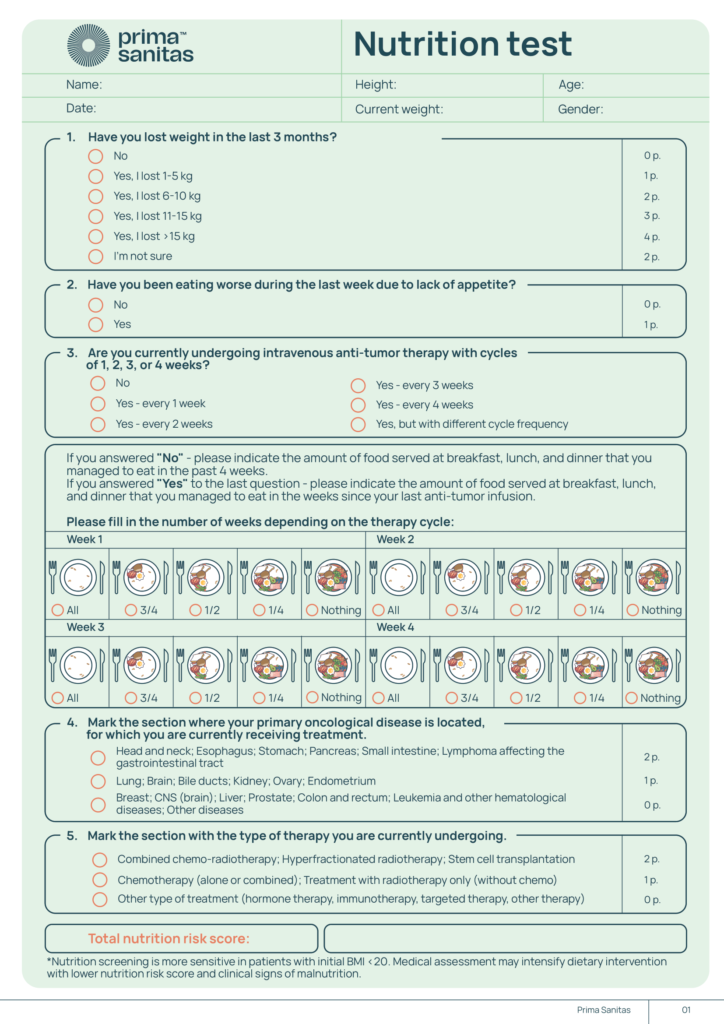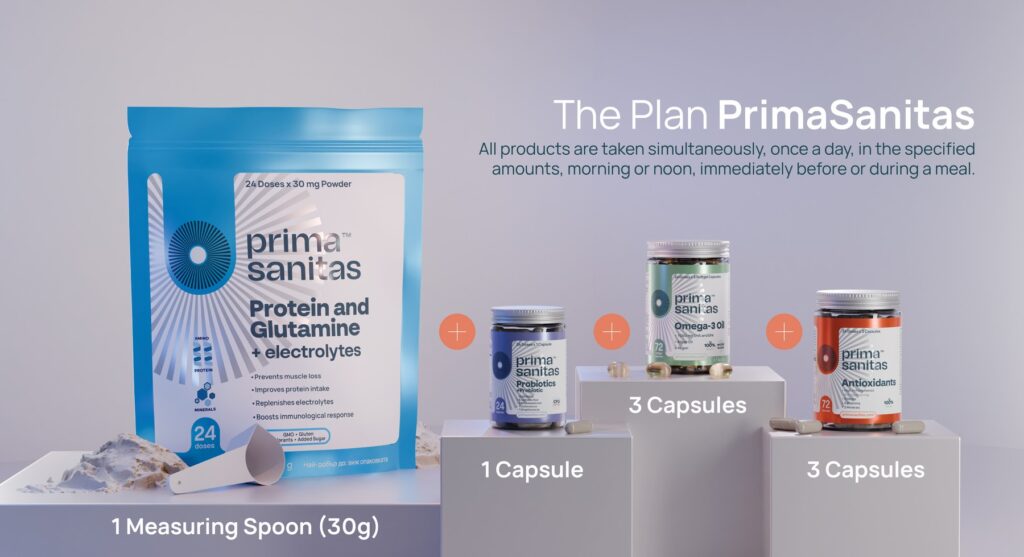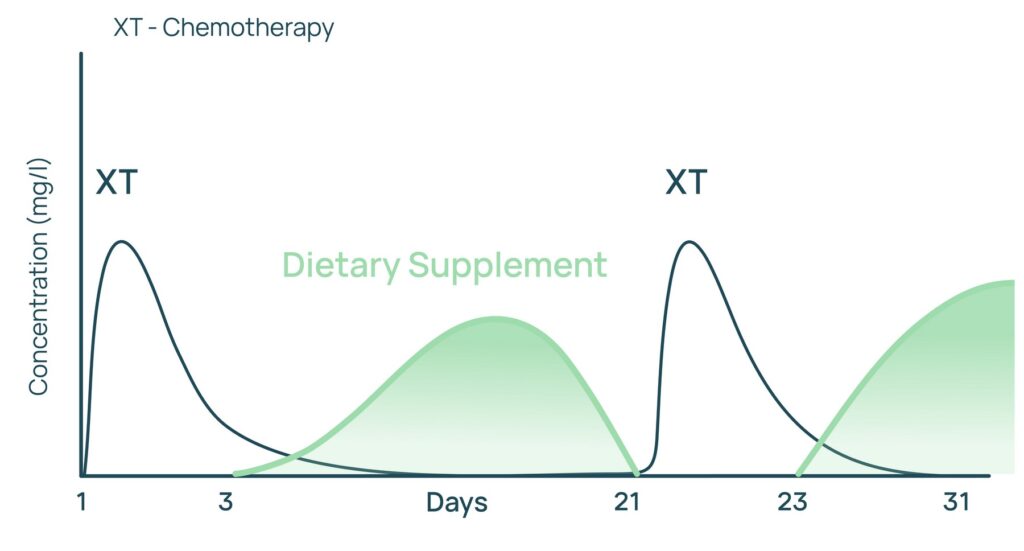
Prevention in malnutrition occurring during chemotherapy is of greater importance and weight than delayed treatment. Assessment of malnutrition development risk as well as the extent of existing malnutrition in cancer patients is key to proper and timely dietary and medical intervention.
Setting and achieving specific nutritional objectives to meet the increased energy demands of the body while preserving the patient’s bodily condition during anticancer treatment is crucial for improving quality of life, minimizing toxicity and complications, preventing and treating cancer-related malnutrition, among other factors.
The primary nutritional goals for patients at risk of malnutrition undergoing chemotherapy include ensuring adequate intake of Calories (25-30 kcal/kg/day), Proteins (1.5-2 g/kg/day), Omega-3 fatty acids (2-5 g/day), Fiber (>30 g/day), Phytochemicals (1-1.5 g/day), as well as preventing deficiencies and insufficiencies of vitamins and minerals.
Prima Sanitas provides both patients and healthcare professionals with accessible information sources regarding nutrition, sleep, and physical activity during therapy. This includes an online generator for creating personalized diets, certified tools, and established methodologies for screening, prevention, diagnosis, and treatment of malnutrition according to the best scientific data and current recommendations from dietary societies.
The use of specialized nutritional supplements for cancer patients by Prima Sanitas, as part of a multimodal comprehensive approach tailored to the patient’s dietary profile and risk of malnutrition, facilitates the achievement of nutritional goals, helps prevent undernutrition, and assists in reducing common adverse side effects and unwanted events during therapy. Instructions for the proper use of nutritional supplements, considerations for drug interactions, and application cycles are provided in the “Working Medical Chart of Prima Sanitas.”


Suitable for cancer-related fatigue; chemotherapy-related nausea and vomiting.
Helps reduce oxidative stress and inflammatory reactions; prebiotic stimulation of the gastrointestinal microbiome.

Suitable for anorexia, cachexia and constipation.
Contributes to reduction of chronic inflammation and inflammatory markers, lipid profile improvement; hepatoprotection; cardiovascular health, prevention of chemotherapy-related peripheral neuropathy.

Suitable for dysbiosis due to antibiotic and antitumor therapies.
Contributes to reduction of chemotherapy-related diarrhea and constipation; reduction of opportunistic infections and gastrointestinal inflammation and improved immune function.

Suitable for lean muscle mass and electrolytes loss.
Contributes to activation of anabolic processes in skeletal muscles; improved immune function; recovery of gastrointestinal mucosa; improved protein intake.
Taking the four products together constitutes a comprehensive nutritional enrichment regimen suitable for high risk patients with suboptimal nutrition .

Recommendation:
Assignment of specific dietary goals (calories and proteins) through the “Prima Sanitas” patient book + Recommendation to start an electronically generated diet at primasanitas.com.
Additionally:
*If needed – medical decision for inclusion of nutritional supplements for prevention and control of symptoms according to the patient profile, dietary compliance and type of therapy. (Omega; Protein; Antioxidant; Probiotic)
Recommendation:
Assignment of specific dietary goals (calories and proteins) through the “Prima Sanitas” patient book + Recommendation to start an electronically generated diet at primasanitas.com + Assignment of nutritional supplements PrimaSanitas Omega-3 +PrimaSanitas Protein for the prevention of malnutrition, sarcopenia and cachexia
Additionally:
*If needed – medical decision for prescription of symptomatic drug treatments if necessary: antiemetic, gastroprotective, anti-inflammatory, antidiarrheal, etc. medications
* If needed – medical decision to include other nutritional supplements for prevention and symptom control relative to patient profile, dietary compliance, and therapy. (Antioxidant and Probiotic)
Recommendation #1:
Referral to a specialized professional nutritionist with an oncology profile for a precise assessment of the degree of malnutrition, caloric needs, assessment of body composition and metabolic changes, intensive dietary follow-up and nutritional interventions on an outpatient or inpatient basis.
Recommendation #2:
In the absence of a professional nutritionist with an oncology profile – carrying out the following dietary interventions by the medical staff in the oncology unit as follows:
Evaluation of total food intake in the days between chemotherapy cycles and the degree of the average caloric deficit.
Example:
(Week 1: 25%+ Week 2: 100%+ Week 3: 100%) ÷ 3 Weeks = 225% ÷ 3 = 75% total food intake.
Recommendation:
Assignment of specific dietary goals (calories and proteins) through the book “Prima Sanitas” + Recommendation to start an electronically generated diet on the site “primasanitas.com” + Assignment of the Prima Sanitas Regimen (Omega; Protein; Antioxidant; Probiotic) with dose modification at medical discretion.In case of additional weight reduction and worsening of malnutrition – switch to feeding with medical food (ONS)
Recommendation:
Assignment of specific dietary goals (calories and proteins) through the book “Prima Sanitas” + Recommendation to start an electronically generated diet on the site “primasanitas.com” + Nutrition with medical food (ONS) according to the degree of the caloric deficit:
Additionally:
*If needed – medical decision for prescription of symptomatic drug treatments if necessary: antiemetic, gastroprotective, anti-inflammatory, antidiarrheal, etc. medications
*Enteral nutrition with a nasogastric tube, gastrostomy, ileostomy is recommended if it is impossible to oral intake of food due to various pathological reasons such as tumors of the head, neck and upper GIT, high-grade anorexia, dysphagia, mucositis, etc.
*Parenteral nutrition is recommended only when enteral nutrition is impossible or the gastrointestinal tract is not functioning.*The follow-up of the clinical indicators of malnutrition, sarcopenia and cachexia as predictors of expected survival is recommended: Evaluation of the Glasgow Prognostic Score with CRP and Albumin, Evaluation of BMI and the percent of weight loss; Evaluation of body composition and muscle loss with clinical and imaging methods and others
To avoid possible cross-reactions or compromising the effectiveness of conventional treatments, intake of dietary supplements needs to be tailored by the physician to the patient’s treatment regimen, following the recommendations below:

Prima Sanitas Antioxidants
Prima Sanitas Antioxidant Complex contains extracts of ginseng, ginger, green tea, hibiscus and saffron, which represent weak CYP450 inhibitors. Concomitant use of weak CYP450 inhibitors with other weak CYP450 inhibitors at a recommended daily allowance is considered safe since it causes a minimal and clinically insignificant change in plasma concentration of drugs that are metabolized by these enzymes.
Concomitant, high-dose and prolonged use of the Antioxidant Complex with drugs that are moderate and strong CYP450 inhibitors carries a risk of clinically significant interaction with a high-percentage change in plasma concentration of drugs that are metabolized by these enzymes.
In this regard, we suggest the following clinical considerations before prescribing Prima Sanitas Antioxidants:
Omega-3 EPA and DHA fatty acids, which are contained in Prima Sanitas Algae Oil, may rarely increase the risk of bleeding when combined with other drugs that cause bleeding, such as Warfarin; Ibuprofen; Aspirin; Meloxicam, etc.
Omega-3 EPA and DHA fatty acids do not inhibit CYP450 enzymes.
Important: Advise your patients to take Prima Sanitas Omega-3 Oil immediately before or during meals.In some more sensitive people intake of high doses exceeding 1 g/d of Omega-3 EPA and DHA fatty acids in the fasting state may cause a slight laxative effect. In this case temporarily reduce intake to 2 or 1 capsule a day according to individual sensitivity.
The use of Prima Sanitas Probiotic + Prebiotic does not require consideration of drug interactions.
The use of probiotics in patients who are severely immunocompromised (e.g. in high-dose myeloablative chemotherapy) carries a risk of iatrogenic infection.
The use of Prima Sanitas Protein and Glutamine + electrolytes does not require consideration of drug interactions.
The use of whey protein requires consideration of a patient’s renal function and intake not exceeding 0.6 g/kg is recommended in patients with CrCl <30 mL/min.
Intake of other nutrients
Advise your patients to avoid intake of foods and dietary supplements that are moderate and strong modulators of CYP450 family enzymes such as grapefruit juice, St. John’s wort, goldenseal (hydrastis), cat’s claw, methystic pepper (kava kava), kratom, echinacea, red clover (trifolium pratense), chamomile, licorice, etc. since they carry a high risk of drug interaction during antitumor treatment.